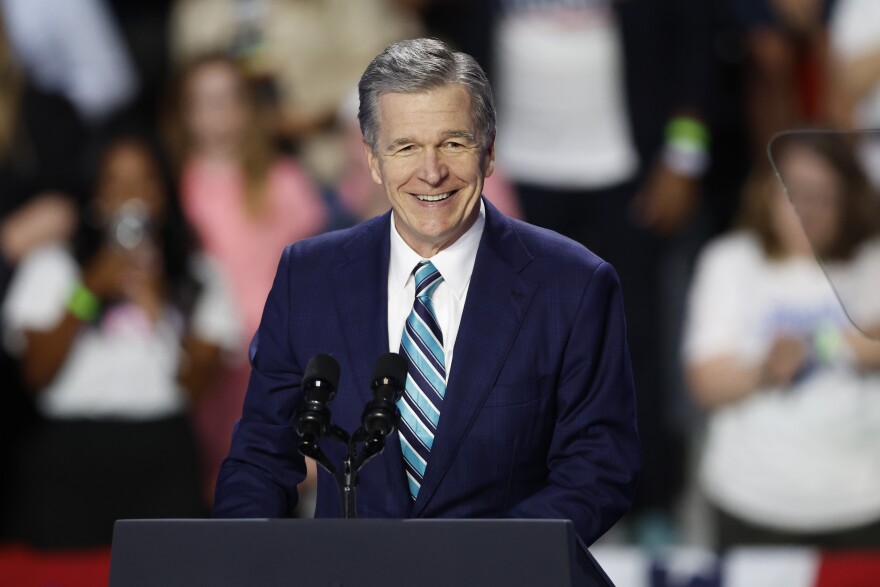Former Democratic Gov. Roy Cooper will run for the U.S. Senate in North Carolina, giving Democrats a proven statewide winner in an open-seat race that is expected to be one of the most competitive 2026 contests.
Cooper made the announcement Monday with a video released on social media and his campaign website. The former two-term governor will immediately become the front-runner for the Democratic nomination in the race to succeed retiring Republican Sen. Thom Tillis.
Republican National Committee Chairman Michael Whatley plans to run for the GOP nomination, with President Donald Trump's blessing, according to two people familiar with his thinking who were not authorized to discuss the matter publicly before an official announcement.
Whatley, the former North Carolina GOP chairman, received Trump's endorsement after the president's daughter-in-law, Lara Trump, passed on the seat.
Cooper's candidacy is a big recruiting win for Democrats, who see the open seat as a top pick-up opportunity in what will be a challenging year. To retake the majority in 2026, Democrats need to net four seats, and most of the contests are in states that Trump easily won last year. Trump won North Carolina by about 3 percentage points, one of his closest margins of victory.
Trump endorsed Whatley on his Truth Social platform Thursday night, posting that should he run, “Mike would make an unbelievable Senator from North Carolina.”
Ex-U.S. Rep. Wiley Nickel already has been campaigning for the Democratic nomination for months. Party primaries would be March 3.
Cooper, 68, has been on statewide ballots going back a quarter-century — serving 16 years previously as attorney general before being first elected governor in 2016.
With a political career going back nearly 40 years, Cooper has had a knack for winning in a state where the legislature and appeals courts are now dominated by Republicans. State law barred Cooper from seeking a third consecutive gubernatorial term. He spent the spring on a teaching gig at Harvard.
State and national Democrats were longing for Cooper to join the race well before Tillis announced June 29 that he would not seek a third term. That news came after Trump threatened to back a primary candidate against him as Tillis opposed Medicaid reductions in the president’s tax break and spending cut package,
Democrats haven't won a Senate race since 2008 in North Carolina, where independent voters tend to vote Republican in federal elections. Statewide races can be financially exorbitant because there are so many television markets — hundreds of millions of dollars are expected to be spent in the race.
Cooper's recent political history has painted him as a fighter against what he's considered extreme Republican policies, while at times finding consensus with GOP rivals.
When asked by The Associated Press last December about a Senate bid, Cooper replied: “If you’re going to run for public office again, you must have your heart and soul in it, you must have the fire in the belly."
As governor, he steered the state through the coronavirus pandemic, Hurricanes Helene and Florence and a law that became an early flashpoint in the culture wars over access to public restrooms by transgender people. That “bathroom bill” was rolled back early in Cooper's first term, and the state’s economy soared during Cooper’s tenure, marked by big jobs announcements and low unemployment.
While Cooper also managed to get Medicaid expansion approved and a landmark greenhouse gases law enacted, he fell short in stopping legislation that widely expanded private school vouchers and narrowed abortion rights.
Cooper’s perceived accomplishments raised his national profile in 2024, making him a potential running mate for Kamala Harris until he said it “just wasn’t the right time” for him and for North Carolina.
Republicans have argued that Cooper remains susceptible politically, citing what they consider an extreme record supporting abortion rights and opposing school choice that led to many vetoes.
They've also cited a gubernatorial administration marked by spending overruns at the state Department of Transportation; its response to Helene and delays in rebuilding or renovating homes after Hurricanes Matthew and Florence; and executive orders that restricted businesses and school instruction during COVID-19. As for the roaring economy, Republicans credit themselves through lower taxes and deregulation.
Tillis’ retirement announcement heartened far-right Republicans and strong Trump supporters who have been unhappy for years with his willingness to challenge Trump’s actions and his Cabinet agency choices.
Republicans had deferred to the president’s daughter-in-law Lara Trump, who is a North Carolina native, North Carolina State University graduate and a popular former RNC co-chair with Whatley during the 2024 election campaign. She posted on the social media platform X on Thursday that she would not seek the Senate seat.

